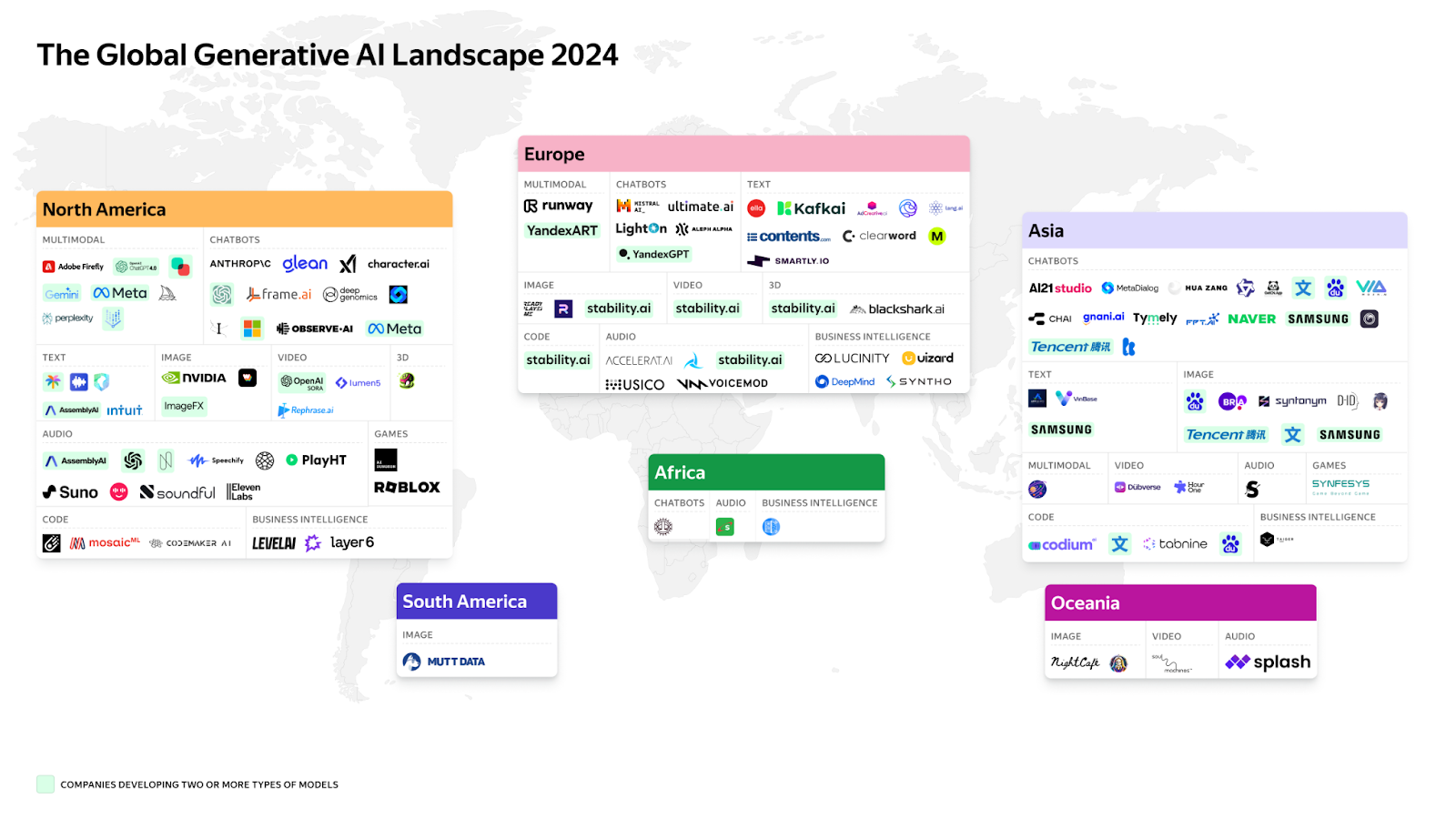In a groundbreaking move, AIport is proud to announce the release of the first truly Global Generative AI (GenAI) landscape. This comprehensive landscape provides an unprecedented overview of the worldwide GenAI developments, addressing the critical need for a more inclusive and diverse representation of AI innovation across the globe.
According to a recent report by Accenture, 97% of executives recognize GenAI’s transformative potential. AIport’s landscape further substantiates this, showcasing GenAI’s significant impact in sectors like business intelligence, education, synthetic data generation, and more. Particularly notable is the landscape’s coverage of 35 countries actively contributing to GenAI, far beyond the typically highlighted regions of North America and Europe.
If it’s crucial for India’s most significant companies, the real question is: are they receiving the correct information necessary to make strategic decisions?” The Global Generative AI Landscape 2024 breaks it down.
Avi Chawla, a data scientist and community manager at AIport, put it:
“The penetration of GenAI in India is a complex and multifaceted issue. Despite being home to a large startup ecosystem, India has yet to make a substantial impact in the AI arena compared to global leaders. However, Indian entrepreneurs are increasingly capitalizing on GenAI enthusiasm, with numerous startups in the sector. Companies like Gan, TrueFoundry, Ola’s Krutrim (an Indian version of ChatGPT), and Cube are examples of startups leading the GenAI space in India. The interest in GenAI has encouraged almost all venture funds in India to develop investment strategies for this emerging space.”
A North America Overview
AIport’s findings underline North America’s dominance in GenAI, with 39 companies leading in terms of the number of models produced and their diversity. North American companies are pioneering in multimodal models and have the highest number of companies releasing multiple GenAI models.
Europe’s Contribution
Europe’s diverse GenAI landscape is highlighted by contributions from 18 countries, with the UK, France, Germany, Netherlands, Austria, and Russia at the forefront. European companies excel in business intelligence and text-related GenAI solutions, though they trail behind North America in multimodal models.
Asia’s Emerging Role
Asia, led by India, China, Israel, Singapore, and Japan, is rapidly catching up in GenAI innovation. While Asia’s GenAI landscape may currently seem less prominent compared to North America and Europe, it shows immense potential for future growth, driven by economic efficiency and a rich talent pool.
India is presented in the landscape with generative models by gnani.ai, Tymely, Dubverse, and APPQUIPO as regional leaders.
The landscape also identifies significant strides in GenAI development in less-represented regions like Oceania, South America, and Africa, underscoring their potential for growth and innovation in AI.
The industry picture
- Roughly 90% of all GenAI companies focus on one model type.
- A total of 11 companies worldwide have developed more than one type of GenAI model. Stability AI leads with five distinct GenAI model types (image, video, audio, 3D, and code), followed closely by OpenAI (chatbot, audio, video, and multimodal) and Google (text, image, audio, and multimodal) – both with four model types.
- Microsoft, Meta, Tencent, Baidu, and Yandex are among those companies that developed between two to three types of distinct GenAI models.
- 13 companies have developed multiple models within a single GenAI category. AssemblyAI has two speech-to-text models, MosaicML offers two iterations of its MPT for code generation, while IPOXCap has introduced two chatbots designed for business intelligence applications.
AIport’s comprehensive research methodology encompassed all 62 countries in the Global AI Index, identifying key players and categorizing them into 10 GenAI solution categories. This approach ensures a balanced and thorough representation of global GenAI development.
Generative AI is poised to be the most transformative technology wave yet, replicating human capabilities with unprecedented efficiency. AIport’s global landscape is just the beginning, marking a new era in understanding and appreciating the diverse contributions to GenAI across the world.
Avi Chawla added, “In summary, while India is yet to establish a significant global presence in the GenAI field compared to some of its international counterparts, the country is making notable progress. This includes rapid growth in the number of GenAI startups, significant investments from major companies, and an overarching recognition of GenAI’s potential impact on the economy and various industries. What’s more, due to wide cultural diversity, the Indian government is also actively investing in GenAI developments for more inclusivity, which is also evident from its recent launch of Anuvaad Bhashini, a tool that helps Indian citizens translate content into different Indian languages.”



